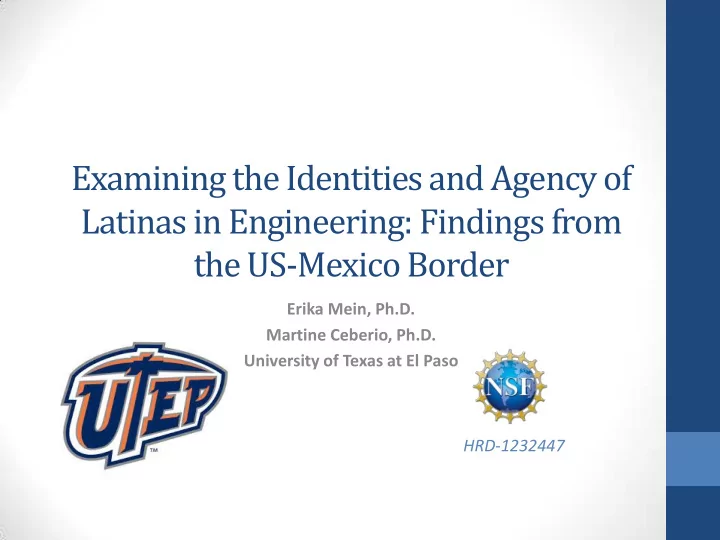

Examining the Identities and Agency of Latinas in Engineering: Findings from the US-Mexico Border Erika Mein, Ph.D. Martine Ceberio, Ph.D. University of Texas at El Paso HRD-1232447
“The Double Bind”
Importance of Examining Identity • Interdisciplinary Team: Co-PIs from Engineering/Computer Science, Education, Anthropology, and Psychology • Research Question: What is the relationship among identity, resilience, and persistence of Latinas in computer science and engineering?
Context: HSI on US-Mexico Border
Theoretical Framework Sociocultural Theories of Identities and Learning • Identities as fluid, multiple, and context- based (Gee, 1996; Holland, et al., 1998) • Identities produced through communities of practice (Lave & Wenger, 1991) and affinity groups (Gee, 2000)
Methods • Participants: 24 female engineering students • Data sources: Three in-depth interviews (Seidman, 2006) • Data analysis: • Open & focused coding in NVivo10 • Narrative inquiry (Labov & Waletsky, 1967; Gee, 1999; Dauite, 2013) • Setting, Catalyst, Crisis/Problem, Resolution, Evaluation, and Coda
Participants
Preliminary Findings (1) Narratives of Uncertainty • Use of particular phrases, e.g. “doubt,” “not sure,” “don’t know” or questions • Crisis points – lower division courses (2) Critical Role of Affinity Groups & Familial Support in Resolving Uncertainties
Narratives of Uncertainty Participant & Major Setting of uncertainty Resolution - person(s) mentioned Gina (Mechanical) Dynamics Her professor Elena (Civil) Statics Upper division students; parents Briana (Mechanical) Chemistry I Parents, esp mother Karla (Civil) Mechanics of Materials Family, esp mother Juliet (Computer Sci) Intro to CS Her professor; her mother Gabriela (Mechanical) Calculus II Her mother Amber (Electrical) Pre-calculus Her mother; School counselor Autumn (Mechanical) Physics I Herself Natalie (Civil) Physics & Dynamics Herself Brittany (Industrial) Electro-mechanical systems Herself
Narratives of Uncertainty [In] one of my classes, we were learning about moments and statics, equilibrium forces and things like that, and I ’ d never been exposed to that. So I was completely confused. I was really lost. And yeah, I was going back and forth thinking, this is pretty difficult. I ’ m not sure that I ’ m grasping these concepts and. “Is engineering really right for me?” You know? ‘Cause I guess I ’ d gotten accustomed to everything comes easy, and it wasn ’t coming easy…But I mean now I look back at that stuff and I don’t even know how I was confused …” Autumn, Mechanical Engineering
Role of Affinity Groups But that’s what all the upper division students would tell me, “Just – just get through it. Just get to your upper division. Just keep fighting. Just keep working at it. And once you get to your upper division it’s going to be a lot easier.” So I think if it weren’t for those friends that I had made who are upper division students, I don’t think I would’ve done as well as I wanted to in the class afterwards. Elena, Civil Engineering
Role of Family Support I remember going to my mom a few times and telling her, “Are you sure I should do engineering? Are you sure engineering’s for me?” ‘Cause I was – I was honestly scared. I was – I was worried, I was scared, I was – I was worried it wasn’t going to go well ‘cause I’ve always taken pride in being able to do what I put my mind to and I had this fear that it was just – everything was going to crumble. Gabriela, Mechanical Engineering
Conclusions • Critical importance of multiple forms of social support for women like these narrators in persisting in a male- dominated field (Seymour & Hewitt, 1997) • Importance of familial support for Latinas (Yosso, 2005) • The need for further investigation of lower division courses, which may serve as “gatekeeping” rather than “gateway” courses for women of color wanting to enter STEM fields • The need for further ethnographic investigation of Latinas’ identity formation in STEM both prior to and in college to inform both theory and practice
Acknowledgements This material is based upon work supported by the National Science Foundation under Grant Number HRD- 1232447. Any opinions, findings, and conclusions or recommendations expressed in this material are those of the author(s) and do not necessarily reflect the views of the National Science Foundation.
Recommend
More recommend